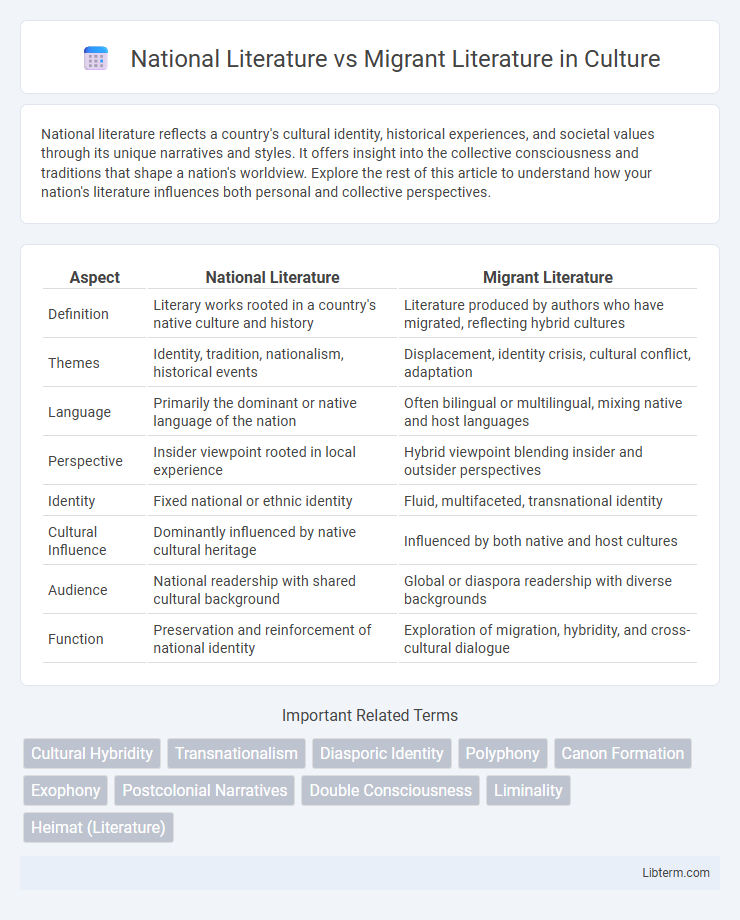National literature reflects a country's cultural identity, historical experiences, and societal values through its unique narratives and styles. It offers insight into the collective consciousness and traditions that shape a nation's worldview. Explore the rest of this article to understand how your nation's literature influences both personal and collective perspectives.
Table of Comparison
| Aspect | National Literature | Migrant Literature |
|---|---|---|
| Definition | Literary works rooted in a country's native culture and history | Literature produced by authors who have migrated, reflecting hybrid cultures |
| Themes | Identity, tradition, nationalism, historical events | Displacement, identity crisis, cultural conflict, adaptation |
| Language | Primarily the dominant or native language of the nation | Often bilingual or multilingual, mixing native and host languages |
| Perspective | Insider viewpoint rooted in local experience | Hybrid viewpoint blending insider and outsider perspectives |
| Identity | Fixed national or ethnic identity | Fluid, multifaceted, transnational identity |
| Cultural Influence | Dominantly influenced by native cultural heritage | Influenced by both native and host cultures |
| Audience | National readership with shared cultural background | Global or diaspora readership with diverse backgrounds |
| Function | Preservation and reinforcement of national identity | Exploration of migration, hybridity, and cross-cultural dialogue |
Defining National Literature: Core Concepts and Boundaries
National literature encompasses works that reflect the cultural, historical, and social identity of a specific nation, often written in the dominant language and rooted in shared traditions. It defines boundaries by emphasizing themes related to national heritage, collective memory, and the socio-political context of the nation-state. These core concepts distinguish national literature from migrant literature, which centers on experiences of displacement, cultural hybridity, and transnational identities.
Understanding Migrant Literature: Themes and Evolution
Migrant literature explores themes of identity, displacement, belonging, and cultural hybridity, reflecting the complex experiences of migration and diaspora. It evolves by integrating multilingual narratives and diverse cultural perspectives, challenging traditional national literature boundaries. This literary form offers critical insights into globalization, social integration, and the politics of migration through personal and collective storytelling.
Historical Context: The Emergence of National and Migrant Narratives
National literature emerged from the 19th-century rise of nation-states, emphasizing cultural identity, language, and shared history to solidify national unity. Migrant literature developed alongside global migration waves in the 20th and 21st centuries, reflecting experiences of displacement, hybridity, and transnational identities. These narratives interrogate colonial histories, diaspora, and the fluidity of belonging, challenging fixed notions of nationhood.
Identity and Belonging: Contrasts in Literary Representation
National literature often reinforces fixed cultural identities and shared historical narratives, emphasizing belonging through collective memory and traditional values. Migrant literature challenges these notions by presenting fluid, hybrid identities that reflect displacement, cultural negotiation, and the experience of liminality. Contrastingly, migrant narratives foreground the complexities of belonging in transnational spaces, exposing the tensions between homeland attachment and integration into new sociocultural environments.
Language, Hybridity, and the Literary Voice
National literature predominantly employs a singular, standardized language that reflects the cultural and historical identity of a nation, reinforcing a cohesive literary voice rooted in shared traditions. In contrast, migrant literature embraces hybridity through multilingual expression and code-switching, capturing the complex, fluid identities of diasporic communities and challenging monolithic cultural narratives. The literary voice in migrant literature often blends diverse linguistic influences, creating innovative forms that interrogate notions of belonging, displacement, and cultural negotiation.
Themes of Home, Exile, and Memory
National literature often centers on themes of home as a fixed, collective identity rooted in shared history and cultural memory, while migrant literature explores home as a fluid, contested space shaped by exile and displacement. Exile in migrant literature frequently represents both physical separation and psychological alienation, contrasting with national literature's emphasis on belonging and territorial continuity. Memory in migrant literature serves as a tool for preserving fragmented identities and negotiating cultural hybridity, whereas national literature tends to use memory to reinforce a unified national narrative.
Cultural Integration vs Cultural Preservation
National literature often emphasizes cultural preservation, reflecting the traditions, values, and historical narratives of a specific country to maintain a cohesive national identity. Migrant literature prioritizes cultural integration by exploring the hybrid experiences of displacement, identity negotiation, and the blending of multiple cultural influences within new social contexts. Together, these literatures highlight the dynamic tension between maintaining heritage and adapting to diverse cultural landscapes in a globalized world.
Influence of Migration on National Literary Canons
Migration reshapes national literary canons by introducing diverse voices and cultural perspectives that challenge traditional narratives and expand thematic boundaries. The influx of migrant writers enriches national literatures with hybrid identities, multilingual expressions, and transnational experiences, fostering a dynamic dialogue between homeland traditions and host country contexts. This process not only diversifies literary production but also prompts critical reexamination of national identity, belonging, and historical memory within literature.
Reception, Critique, and the Role of the Reader
National literature often receives critique framed by cultural preservation and identity, with readers engaging through familiar socio-historical contexts that reinforce shared values. Migrant literature challenges traditional reception by introducing hybrid narratives and diverse perspectives, prompting critics to reevaluate notions of belonging and cultural boundaries. The role of the reader expands in migrant literature, requiring a more active interpretive approach to navigate cross-cultural dialogues and transnational experiences.
The Future of Literature: Blurring Borders and New Possibilities
National literature traditionally centers on themes reflecting a specific country's cultural identity, history, and language, while migrant literature explores the complexities of displacement, hybridity, and cross-cultural experiences. The future of literature involves blurring these borders, as writers increasingly blend national narratives with transnational perspectives, creating hybrid genres that challenge fixed identities. Digital platforms and global interconnectedness amplify diverse voices, fostering new possibilities for storytelling that transcend geographic and cultural limitations.
National Literature Infographic

 libterm.com
libterm.com